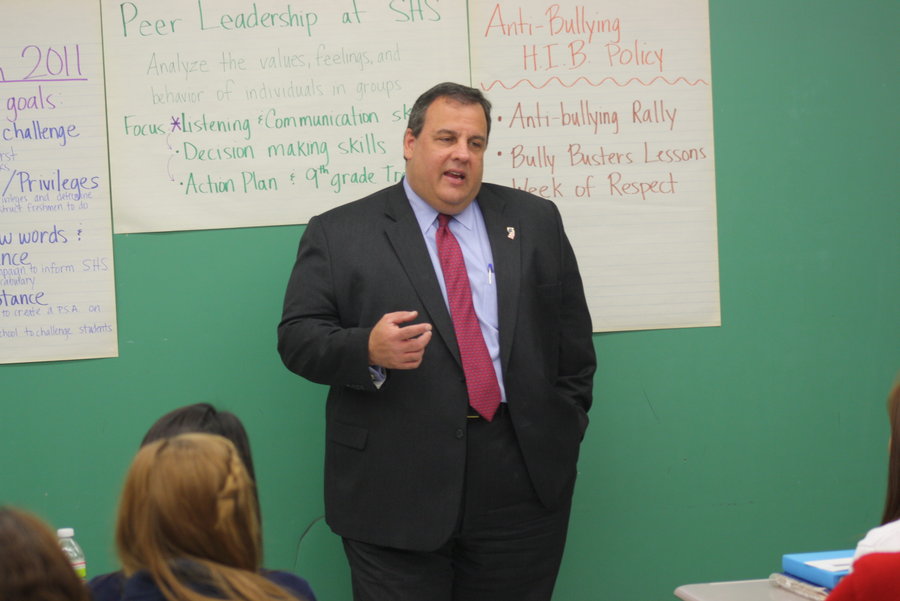Gov. Chris Christie and Acting Education Commissioner Chris Cerf were in Secaucus on Wednesday to propose a new education reform agenda as part of the state’s recent application for a waiver from the federal “No Child Left Behind” (NCLB) education requirements.
The state is one of 11 seeking relief from provisions in NCLB.
“There are hundreds of schools in this state where we are engaged in a moral crisis, where kids are not being given an equal chance at success,” said Acting Education Commissioner Chris Cerf. Cerf said the release from the NCLB provisions would provide greater financial flexibility and allow the state to get out of the “handcuffs” of how it uses federal funds, currently $25 billion a year.
NCLB, proposed in 2001 during the beginning of the administration of Pres. George Bush, includes mandates for testing and assessments that teachers have protested for years.
“What we are looking for is accountability.” – Chris Christie
____________
Christie did acknowledge that the state ranks at the top of achievement levels nationally and that it has outstanding teachers, which he said Secaucus is an example of.
Secaucus is part of a pilot program for a statewide educator evaluation system that is part of the School Children First Act bill, which evaluates teachers partly on how well students do on standardized testing and partly on classroom observations.
Christie’s plan pushes forward four bills previously put forth in the legislature including: the School Children First Act; Charter Reform Bill; Opportunity Scholarship Act; and the Urban Hope Act.
The bills address educator evaluation, which would impact tenure and compensation. They also support the increase of charter schools, provide scholarships for low-income students, and provide support for five of the state’s worst performing districts.
“We are not looking to spend any less; what we are looking for is accountability,” said Christie. Christie said that his plans are bipartisan and consistent with Pres. Barack Obama’s educational efforts.
Randina agrees
“I think the governor is making headway in the kind of reform we need here in the state of New Jersey,” said Schools Superintendent Cynthia Randina. “I think his position of lending more support to districts in need is very important.”
Randina said she thought it was important that the governor was going to allow school districts to determine their own methods of reform and improvement.
“Everything is not going to be dictated from on high,” she said.
Randina said that the school district wants to help people move along in their professional practice and believes that 99 percent of teachers in the district are on the right track.
“We don’t want to use a hammer. We want to help people to move along in their professional practice.”
Christie not angry at teachers but at union
In the past, Christie’s plans have not been received well by the New Jersey Education Association, the teachers’ union. The union has criticized his teacher evaluation proposals for relying too heavily on standardized testing. The NJEA has proposed its own reform plan. Christie said that the NJEA has been “obstructionist” and that he is still angry at the union.
“The union is very powerful and a lot of people are against it in the union. But you need accountability,” said Secaucus school board member Dora Marra. She supports Christie’s education proposals. “You have to have some accountability that you are doing the right job.”
“Hopefully both sides can come together and compromise and do what is best for the children of the state,” said Councilwoman Susan Pirro, who is an NJEA member. She said that NJEA was not only there for educators but that “NJEA’s responsibility is for the children of the state.”
Mayor Michael Gonnelli said he needed more details on the proposals before he could take a position but that he felt the governor believes strongly in education reform.
“I was really impressed with him,” said Gonnelli. “In the classroom, he was really good with the kids.”
Teens talk about trust with gov
Before the announcement, Christie met with a classroom that participates in a Peer Leadership workshop, taught by Allison Hess-Urbanovitch at Secaucus High School. The cross-curricular program helps students become better prepared when they graduate high school and provides for a smooth transition between grades, according to Linda Diemer, director of secondary education.
The students had questions ready for the governor and discussed their experience in the program.
“It is all about taking risks, trusting others and supporting others,” said one student.
Another student said the program has helped her get out of her comfort zone.
“When people get to know you it is a lot harder to hate,” said Christie. “But when you are up close with someone and you trust them…that becomes a much broader boulevard for you to find understanding than keeping distance.”
Adriana Rambay Fernández may be reached at afernandez@hudsonreporter.com.
